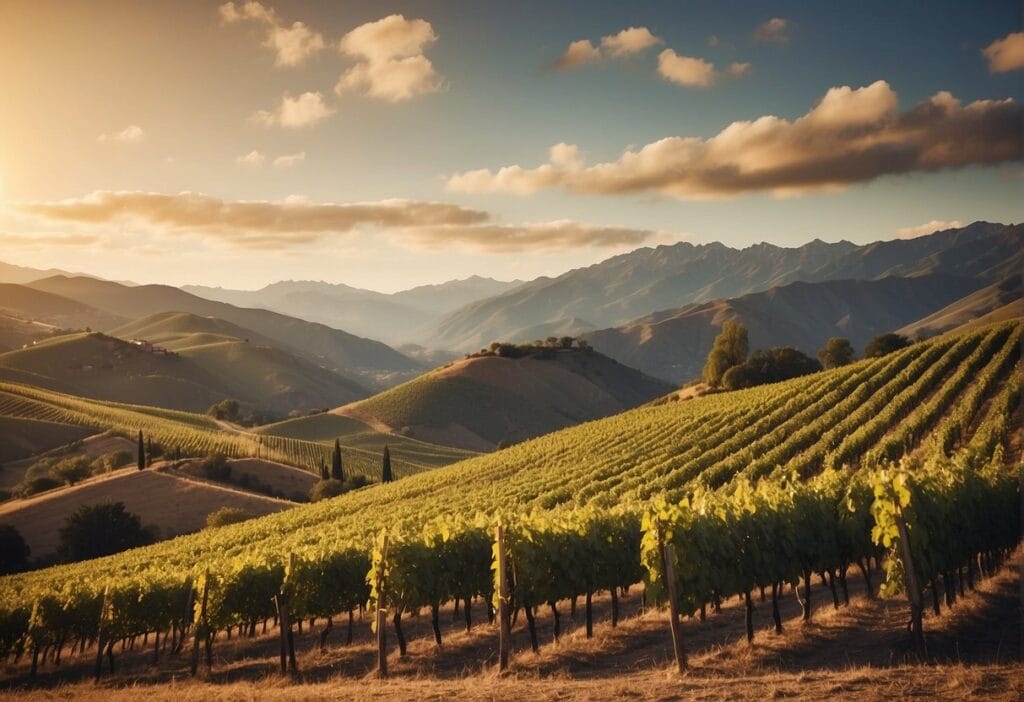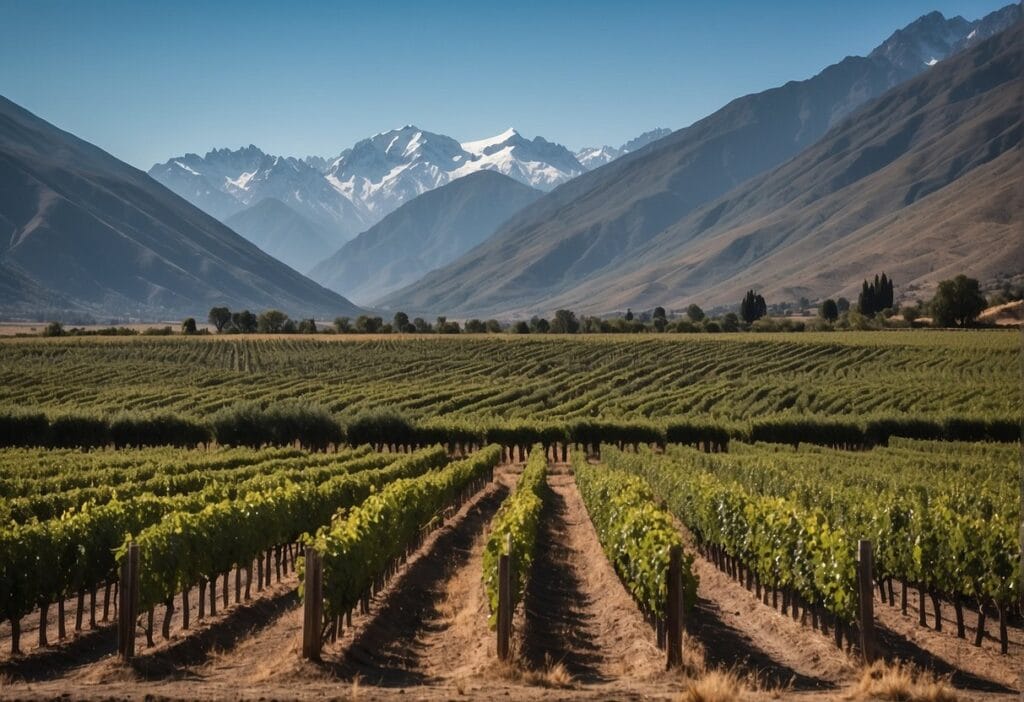Nestled in the northeastern corner of Italy, the Friuli Venezia Giulia wine region is a hidden gem that awaits your discovery. This area is renowned for its crisp and aromatic whites which have gained a commendable reputation on the global stage. As a unique geographical and cultural crossroad, it is bordered by Austria, Slovenia, the Adriatic Sea, and the Veneto region, which endows Friuli with a truly distinctive terroir.
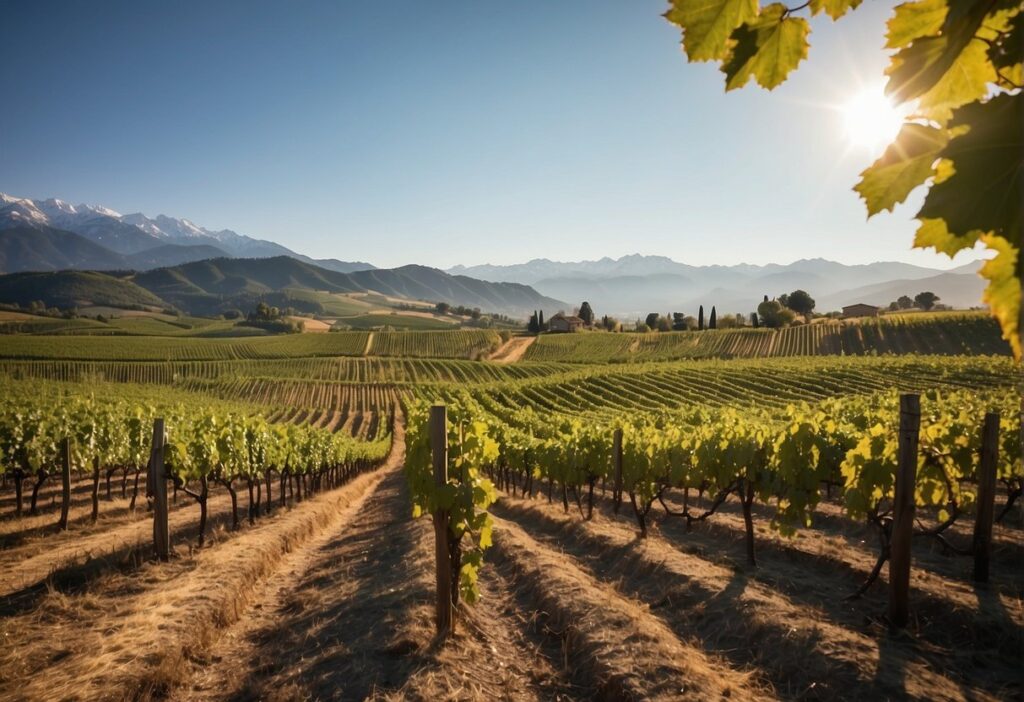
Within Friuli, the climate varies from the cooler zones in the mountains, perfect for preserving the acidity and freshness of grapes, to the temperate coastal areas that impart a fuller and richer flavor profile to the wines.
The blend of traditions and influences from neighboring cultures is reflected in the wines you’ll find here. Recognized for stringent wine laws and quality-focused production, Friuli is not just about winemaking—it’s a testimony to the integrity of the region’s vintners and an homage to their meticulous viticultural practices.
Key Takeaways
- Friuli Venezia Giulia offers distinctive white wines that showcase the region’s varied climate and geography.
- The region is marked by stringent appellations and wine laws, ensuring high-quality wine production.
- Friuli’s winemaking is deeply entwined with local culture and culinary traditions, enriching the visitor experience.
Geography and Climate
Discovering the Friuli-Venezia Giulia wine region leads you through a diverse landscape and distinct climate zones. Your exploration will unveil the region’s geographical nuances and how they contribute to its wine profiles.
Geographical Location
Friuli-Venezia Giulia lies in northeastern Italy, sharing borders with Slovenia to the east and Austria to the north. As you enter this area, you’re greeted by the stunning blend of the Adriatic Sea to the south and the mountains as part of the southern limestone Alps embracing the region from the north and east. Key cities such as Udine and Trieste offer gateways into the region’s rich and varied lands.
Climate
The climate of Friuli-Venezia Giulia varies significantly. Close to the coastline, where Trieste enjoys its prominent position, you encounter a mild Mediterranean climate. As you travel inland towards Udine, the temperature becomes a touch cooler and the plains show a blend of continental traits.
Seasonal temperatures fluctuate noticeably, with warm summers ideal for vineyard cultivation, especially as you near the Adriatic Sea. The rainfall here nurtures the grapes, balancing the sun’s warmth with adequate water to craft the region’s celebrated wines.
History
As you explore the Friuli Wine Region, you’ll discover a tapestry of cultures that have meticulously shaped its winemaking heritage. From ancient Rome to the grand Habsburgs, each era left a distinct imprint that’s reflected in today’s wines.
Historical Influences
Friuli, a northeastern gem in Italy, has been a cultural crossroads due to its strategic location. Venice, an erstwhile maritime republic, vastly affected the region’s history, elevating it to a crucial junction on the Mediterranean spice route.
In the hallowed halls of the Abbazia di Rosazzo, where monks once toiled, you’ll find a repository of grape-growing and wine-producing wisdom that dates back generations. This abbey symbolizes the interplay between faith and agriculture that has long characterized the region.
The Austro-Hungarian Empire brought about a significant phase; under the Habsburgs, Friuli was molded by Central European influences. The empire’s collapse post-World War I led to Friuli’s annexation by Italy, drawing a new chapter entwined with modern Italian identity.
The Lombards, Germanic people who ruled over Italy for centuries, and the Venetians, famous for their sprawling maritime empire, also courted this region. Their legacies are engraved not just in stone, but in the very vines that traverse these lands.
Throughout its storied past, the region preserved its wine-making traditions while being passed amongst powerful sovereignties, including the Habsburgs, whose economic and cultural policies greatly impacted vineyard cultivation practices and wine styles in Friuli.
Each historical layer, from the Lombards to the Venetians, and the Habsburgs, has contributed to the unique viticultural identity of Friuli, turning it into a repository of variegated wine profiles waiting for you to uncover.
Appellations and Wine Laws
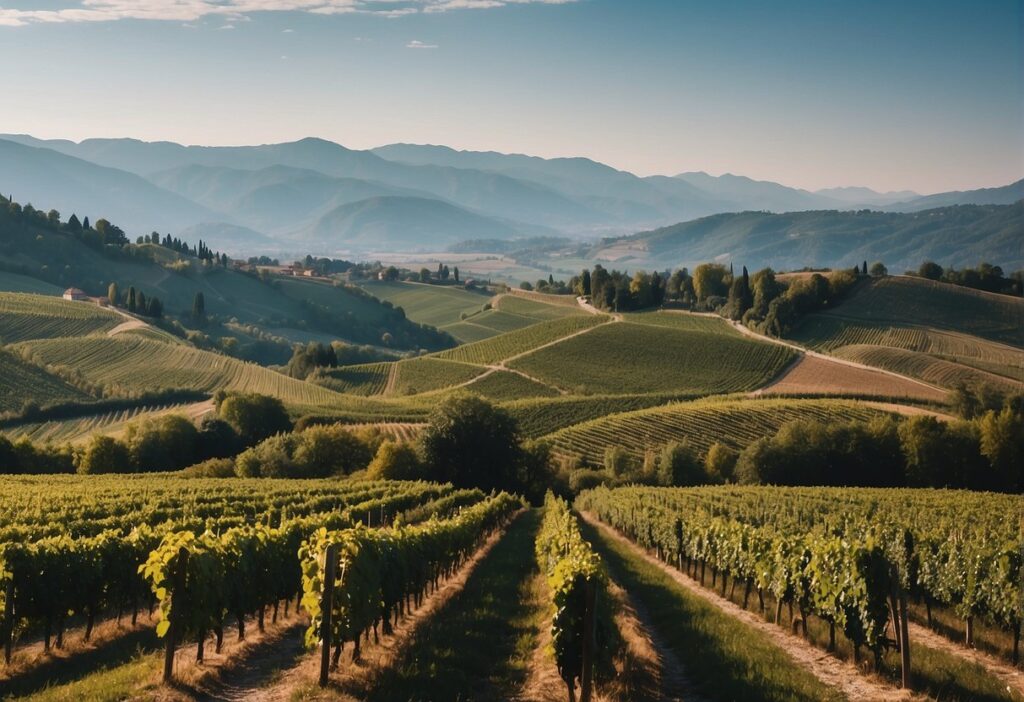
The Friuli-Venezia Giulia wine region in Italy is governed by stringent laws that safeguard its wine heritage, ensuring that every bottle you open meets rigorous standards for quality and origin.
DOC and DOCG
Friuli’s winemaking is categorized under various Denominazione di Origine Controllata (DOC) zones, including Grave, Colli Orientali, and Collio, among others. These appellations ensure that wines produced in these areas adhere to specific production methods and grape varieties.
Furthermore, there are Denominazione di Origine Controllata e Garantita (DOCG) zones, a notch above DOC in terms of quality assurance, presenting wines from areas such as Ramandolo and Rosazzo. Walk through these regions and you’ll find a tapestry of wines with unique characteristics tied to their terroir.
DOC areas include:
- Grave
- Colli Orientali
- Collio
DOCG areas include:
- Ramandolo
- Rosazzo
IGP and Other Classifications
Besides DOC and DOCG, Italy‘s wine law includes the classification of Indicazione Geografica Protetta (IGP), which offers a more flexible set of regulations regarding grape varieties and winemaking techniques. This allows for the production of diverse wine styles that still retain a stamp of regional character. Delle Venezie is an example of an IGP designation in this area, representing a larger zone that encompasses parts of the Friuli Venezia region.
Keep an eye out for wines labeled as IGP for an exploration into the broader strokes of Friuli’s wine artistry.
Grape Varieties and Wine Styles
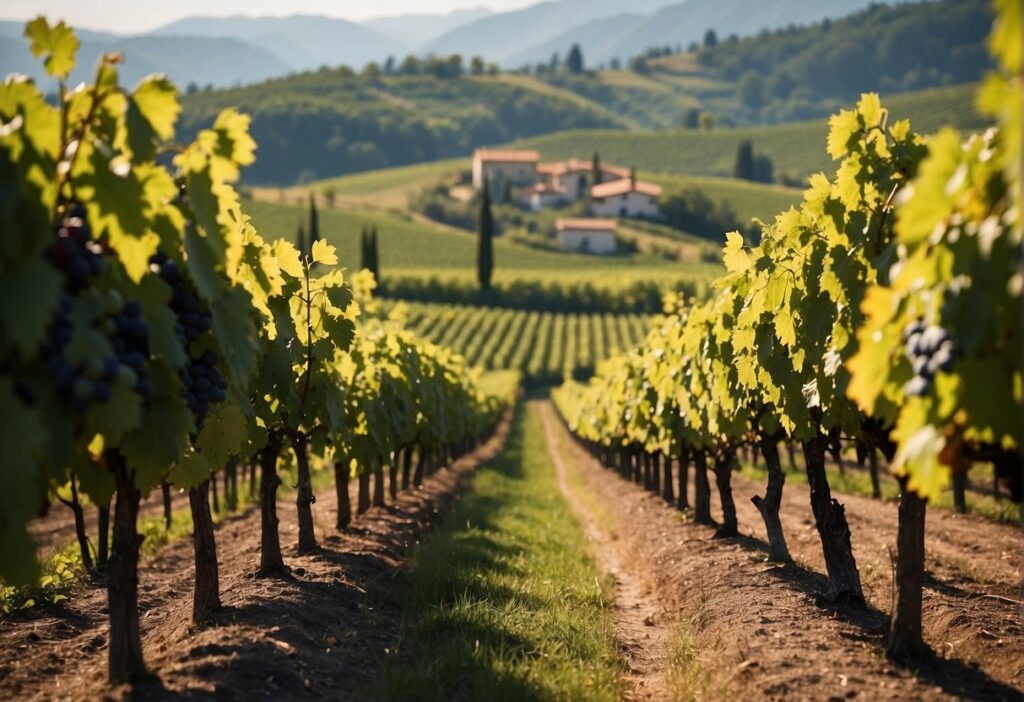
The Friuli Wine Region offers an array of distinct wines, shaped by unique grape varieties and a rich terroir. You’ll discover traditional Italian grapes alongside international varieties, each contributing to the region’s diverse wine portfolio.
White Wines
Friuli-Venezia Giulia is renowned for its white wines, which often exhibit a bright acidity and aromatic complexity. Among its stars is Friulano, predominant in Friuli Grave, which imparts almond and floral notes. The globally recognized Pinot Grigio achieves a full-bodied, crisp character here. Other key white grapes include:
- Sauvignon Blanc: Known for its herbaceous flavors.
- Chardonnay: Offers a versatile profile, ranging from apple to tropical fruit flavors.
- Ribolla Gialla: A native gem yielding structured and mineral-driven wines.
- Malvasia: Generates aromatic wines with spice and stone fruit nuances.
These varieties are often blended in wines like Collio Bianco, creating harmonious and sophisticated expressions of the region’s white wine prowess.
Red Wines
While Friuli is perhaps more famous for white wines, its reds deliver remarkable quality. The region masterfully cultivates both international and indigenous red grapes:
- Merlot: Provides plush, velvety wines with ripe fruit flavors.
- Cabernet Franc: Distinctively spicy and robust.
- Cabernet Sauvignon: Produces structured wines with great aging potential.
- Refosco dal Peduncolo Rosso, Friuli’s indigenous red, offers spicy, berry-laden wines with a distinctive character.
Red wines from Friuli balance fruit with earthy notes, often benefiting from the region’s diverse terroir.
Specialty Wines
Friuli’s specialty wines showcase the region’s versatility and innovation:
- Orange Wines: Wines like Ramato Style Pinot Grigio are made by macerating white grape skins, resulting in a unique, coppery-orange hue and complex flavors.
- Sweet Wines: Grapes like Picolit and Verduzzo are used to create exquisite dessert wines with refined sweetness and aromatic intensity.
- Sparkling Wines: Prosecco, though more closely associated with Veneto, is also crafted in Friuli, displaying vivacious effervescence and refreshment.
These specialty wines epitomize the experimental spirit and historical richness of Friuli’s wine culture, offering you an intriguing sip of diversity.
Viticultural Practices
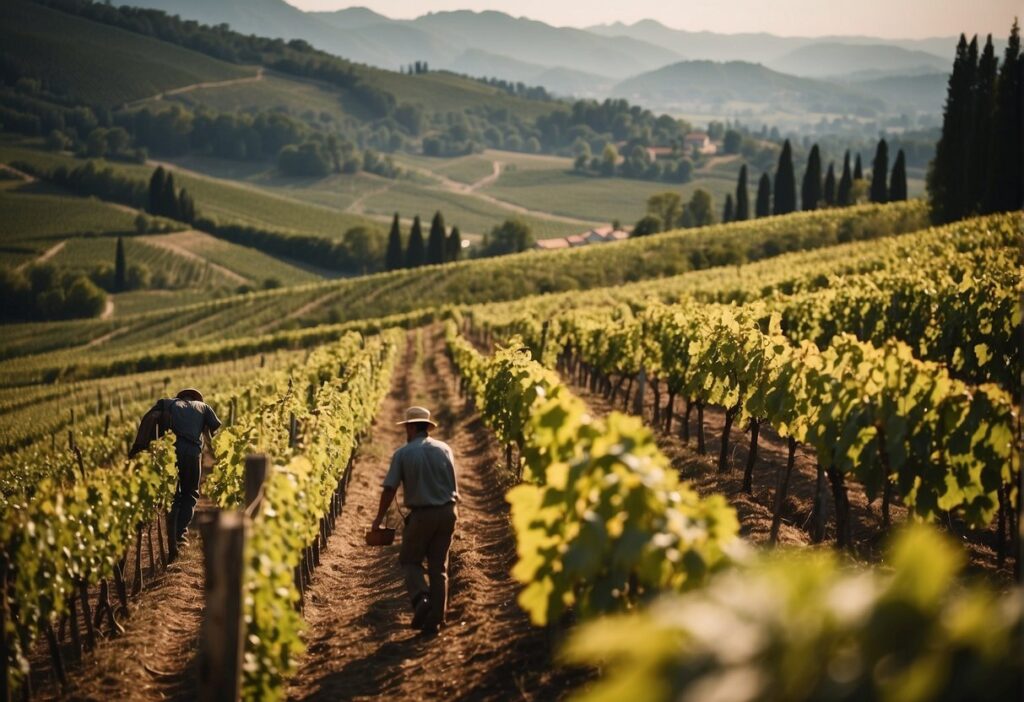
In the heart of the Friuli-Venezia Giulia region, viticultural practices have been refined over centuries, harmonizing with the unique terroir to produce distinctive wines such as the minerally Vitovska.
Vineyard Management
Terroir plays a central role in shaping the characteristics of Friuli’s wines. With your attention to the combination of soil, climate, and topography, you can understand the high quality of the wines from this region. The area of Corno di Rosazzo, for example, is known for its unique soil composition and microclimate that contribute to the distinctiveness of the local wines.
The use of modern tools like GPS technology aids in precise vineyard management, ensuring that each vine is optimally positioned for sunlight and irrigation. This careful management is critical for varietals like Vitovska, which thrive in the specific environmental conditions found in Friuli.
To add complexity and flavor, aging wines in oak barrels is a common practice in Friuli. This not only imparts a robust character to the wines but also showcases the region’s ability to blend traditional methods with modern winemaking techniques.
By understanding these practices, you gain insight into the dedication and skill that go into every bottle from Friuli’s cherished vineyards.
Wine Production and Aging
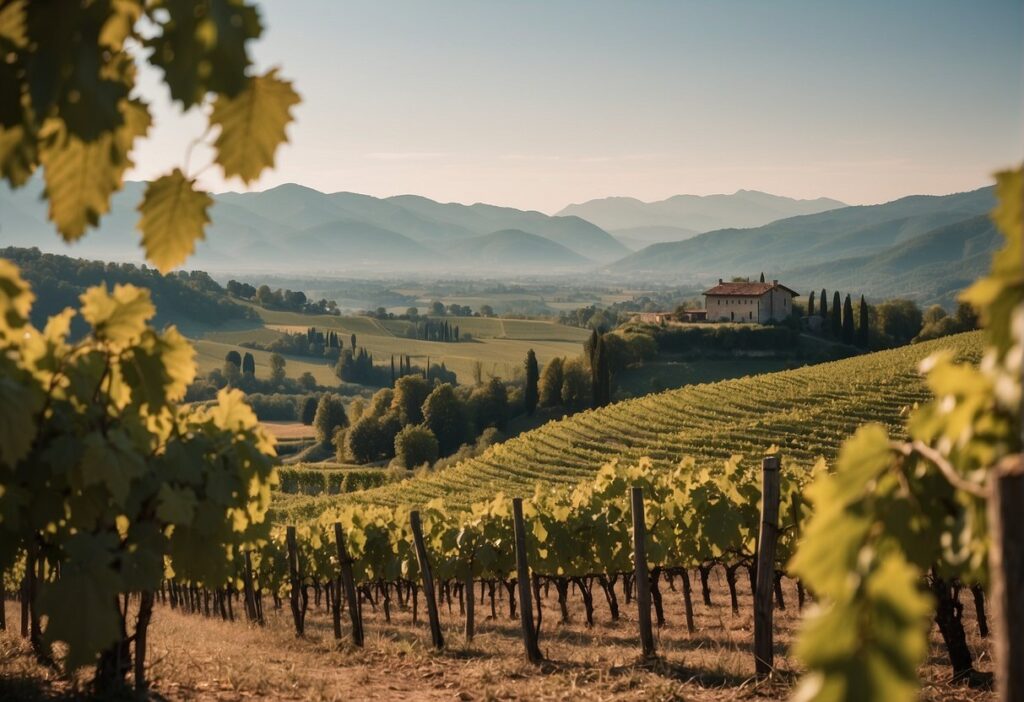
The wine production process in Friuli-Venezia Giulia is as unique as the region itself, focusing on tradition and innovation to create distinctive wines. You’ll encounter a variety of winemaking methods, including the intriguing production of orange wines and the usage of oak barrels that impart complexity.
Vinification
In the Friuli wine region, especially in areas like Collio Goriziano, vinification is carried out with meticulous attention to preserve the aromatic qualities of indigenous grapes such as Traminer. Orange wines are a specialty here; they’re made from white grapes that ferment with their skins on, resulting in a deep hue and robust flavor, often benefiting from the ramato style, a traditional method giving the wine a copper tone.
You’ll find that aging in oak barrels is a common practice for both red and white wines, contributing nuanced flavors and enhancing the wine’s structure. This barrel aging can vary from a few months to several years depending on the winemaker’s intentions, allowing for the full expression of the vineyard’s character in every glass.
Remember, the production and aging timeline in Friuli-Venezia Giulia is not just a process, it’s an art—yielding wines that tell a story of their origin with every sip.
Wine Economy
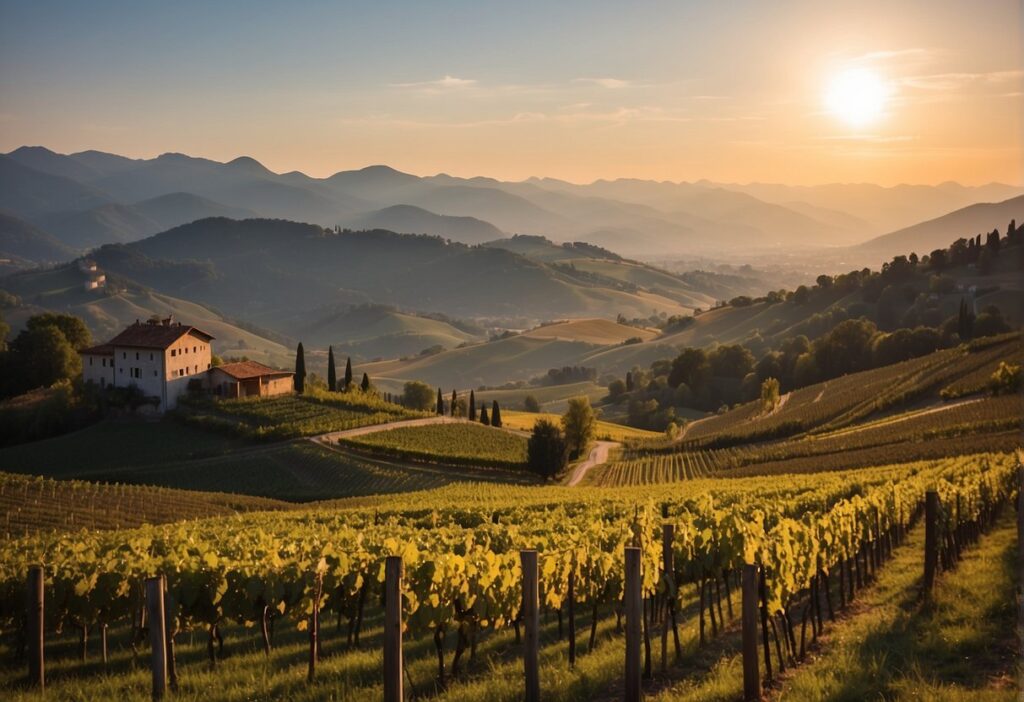
Discover how the Friuli wine region contributes to Italy’s vino marketplace with a distinctive approach to viticulture and business. Your understanding of the region’s economic influence is crucial to appreciating its wines.
Exports and Global Recognition
Friuli-Venezia Giulia has carved a niche in the global wine market with precision. Your curiosity about international wines will show you that this Italian region’s wines are highly sought after, especially for their exquisite white varieties. Noted for its light-bodied, refreshing white wines, the region also produces esteemed Merlot which holds a significant place in Friuli’s wine economy.
Engaging in a sort of triangular trade, Friuli exports its wines far beyond Italy’s borders, reaching markets like Australia. There, wine enthusiasts are drawn to the unique characteristics of Friuli’s vineyards—located ideally between the Alps and the Adriatic Sea.
The region’s wine production features an intriguing blend of traditional techniques and innovative methods that result in wines with distinct flavours and aromas.
When you look at the global recognition of Friuli wines, you’ll find awards and acknowledgments from wine critics and international competitions. This acclaim boosts the prestige of Friuli wines and supports their export economy. It’s this global esteem that secures Friuli’s status on the world stage and underlines the quality of its wine production.
Culinary Traditions

Friuli-Venezia Giulia, a treasure tucked in northeastern Italy, is a region where every bite of food and sip of wine tells a story of cultural convergence. You’ll soon discover that its culinary scene is as rich and varied as its history.
Local Gastronomy
Prosciutto from San Daniele and surroundings is celebrated worldwide for its delicate flavor, a result of the unique microclimate of the region. You can enjoy this air-cured ham sliced thin, adorning a platter of the region’s favorites.
The Frasca, a traditional farmhouse eatery, provides an authentic space to delve into Friulian hospitality and cuisine. It’s typical to see one marked by a hanging branch at the entrance in the inviting rural landscape.
Friuli wines stand among Italy’s most acclaimed, especially for their white varietals. The local wineries, nestled within picturesque villages, produce bottles imbued with the area’s distinct terroir. A visit to a vineyard will offer you an insight into the winemaking process, along with tastings that showcase the region’s vinous diversity.
Local gastronomy also reflects the variety of cultural influences, ranging from Austrian to Slavic. Dishes such as frico, a deliciously crispy cheese and potato pancake, exemplify the meeting of simplicity and flavor that characterizes Friulian cuisine.
Tourism and Hospitality
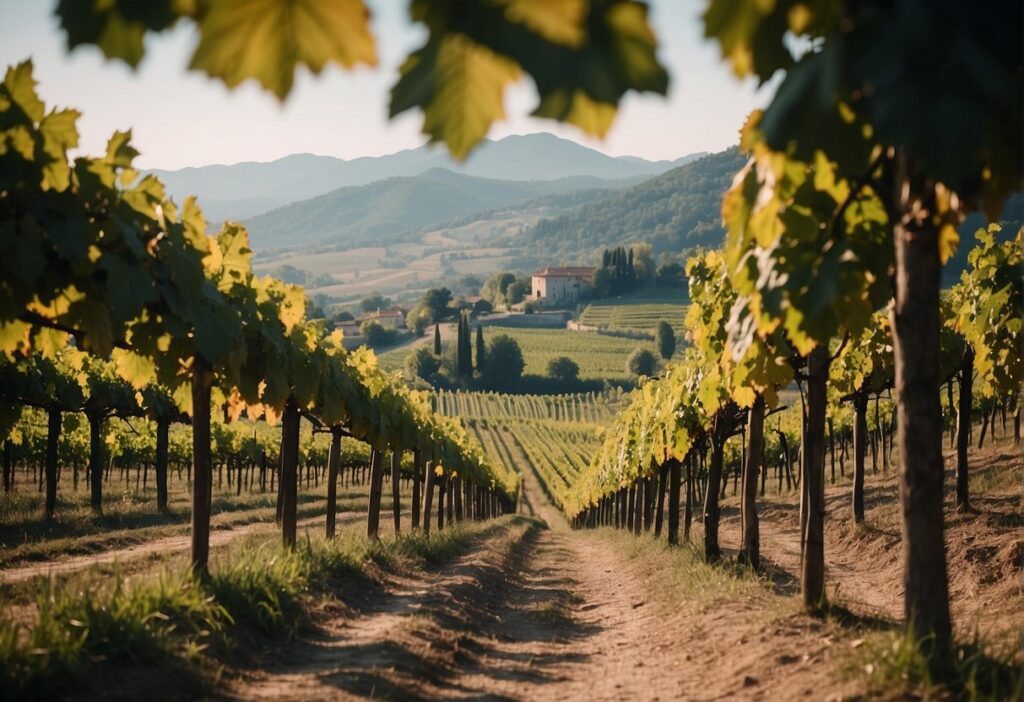
When you visit the Friuli-Venezia Giulia wine region, you’re stepping into an area bustling with authentic Italian culture and some of the most innovative wineries in Italy. This region, renowned for its hospitality, offers unforgettable winery tours and tastings set amidst picturesque landscapes.
Wineries and Tasting Experiences
Friuli is home to a vibrant winemaking tradition, with groundbreaking winemakers like Mario Schiopetto and Josko Gravner helping to elevate the region’s status on the world stage. Exploring Friuli’s wine scene, you’re treated to a spectrum of white wines that express a unique terroir, while also being introduced to intriguing orange wines that have been getting quite a bit of attention lately.
In the cities of Trieste and Udine, along with the expansive countryside that reaches towards the Veneto border, you have the opportunity to visit a variety of wineries offering tailored tasting experiences. Whether you delve into a glass of crisp Friulano or indulge in a robust Merlot, you’ll quickly understand why Italian wines from this region are celebrated internationally.
To get a taste of the innovation in the region, a visit to the wineries that follow in the footsteps of Mario Schiopetto, the pioneer of modern white winemaking in Italy, is a must. For those eager to explore the roots of natural winemaking, seek out the cellars of Josko Gravner, who is known for his iconic amphora-fermented wines.
The hospitality in Friuli is as heartwarming as the wine is rich. You can anticipate personal attention and intimate tours that often end with a generous sampling of the winery’s offerings. Many wineries also extend their hospitality to include food pairings, showcasing regional specialties and demonstrating the synergistic relationship between Friuli’s wine and cuisine.
Prominent Figures in Friuli Wine
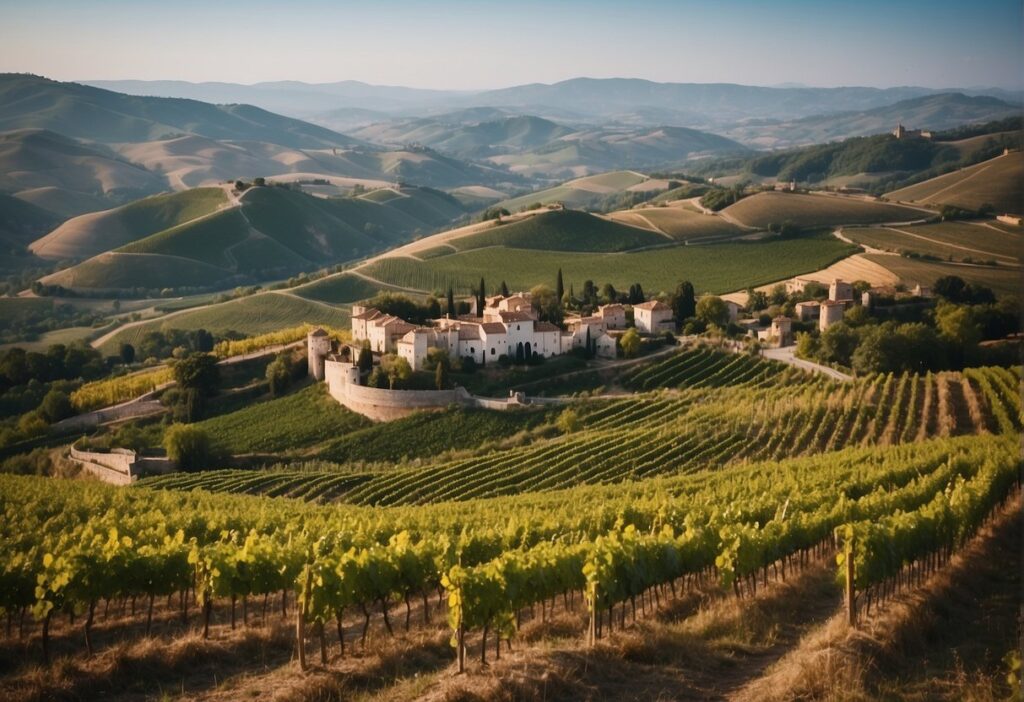
Your journey into Friuli wine isn’t complete without recognizing the vintners and sommeliers who have shaped its viticulture and placed it on the world map.
Influential Winemakers
Friuli-Venezia Giulia, with its rich diversity of wines, owes a lot to Mario Schiopetto, a pioneer of modern winemaking in Italy. His innovative techniques in the 1960s, like temperature-controlled fermentation, propelled the region’s whites to international acclaim. Schiopetto’s Friulano and Sauvignon labels continue to set standards for excellence.
Moving from modernization to a return to ancient winemaking, Josko Gravner stands out for his adoption of amphora-fermented wines. Gravner’s commitment to biodynamic farming and natural winemaking processes lends his wines, particularly the Ribolla Gialla, a unique and notable character.
The region’s sommeliers also play a crucial role, being ambassadors of Friuli’s wine story. They guide you through the nuances of each grape, producer, and blend, ensuring your experience with Friuli wines is as rich as its history.
Culture and Traditions
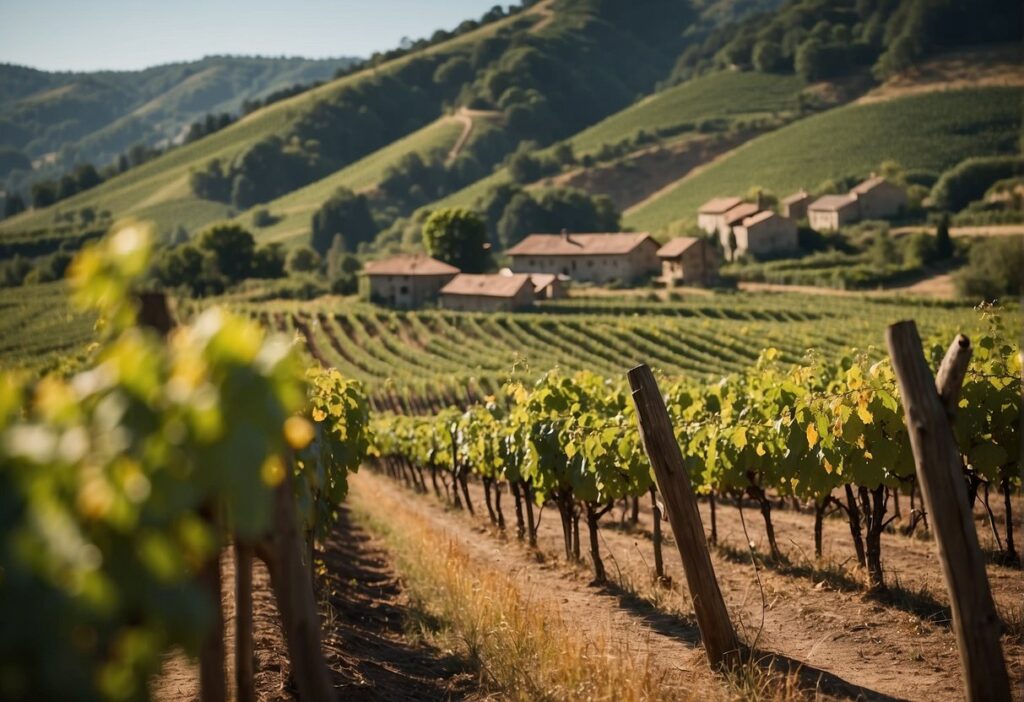
In the Friuli Wine Region, you’ll explore a vibrant tapestry of cultural practices, enriched by a fascinating blend of Friulano heritage and the broader Friuli-Venezia Giulia area’s varied history.
Festivals and Events
You’re invited to immerse yourself in the spirited festivals and events celebrated within Friuli-Venezia Giulia. Revel in traditions that reflect the rich cultural mosaic of this northeast Italian gem.
- La Festa dei Pomi – Celebrated in the apple orchards of Friuli, this festival is a Fall highlight where you’ll taste freshly harvested fruits and apple-based delicacies.
- La Festa del Vino – Taking place in the heart of wine harvest season, you get to enjoy the region’s excellent wines, with guided tastings and vineyard tours.
Each event offers you a glimpse into local life, with music, food, and wine that tell the region’s multicultural story. Embrace the convivial atmosphere and let Friuli’s warm hospitality lead you through a memorable, cultural journey.
Conservation and Sustainability
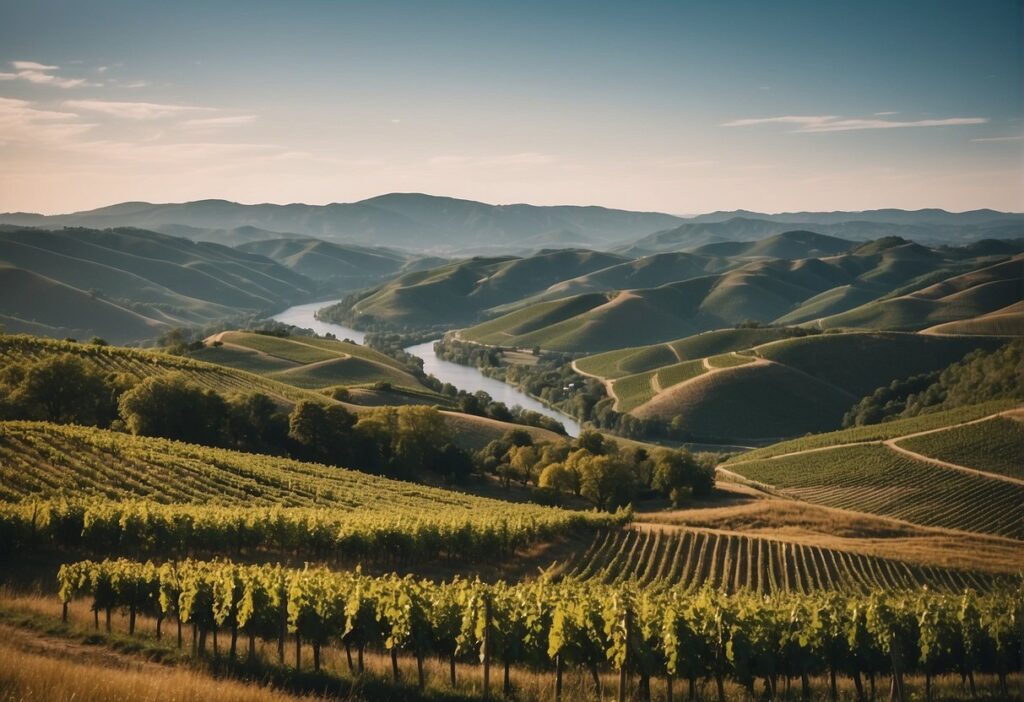
The Friuli Venezia Giulia wine region is not just celebrated for its distinctive wines but also commendable for its commitment to sustainable viticulture. The landscape of this area supports a rich tapestry of biodiversity, integral to maintaining a balanced ecosystem that benefits both the vineyards and the environment.
Sustainable Viticulture
Your appreciation for wine likely brings with it a respect for the land from which it comes. In Friuli Venezia Giulia, winemakers harness the landscape‘s natural assets—its lush hills and sprawling plains—to cultivate vines without compromising the earth’s resources.
Pioneering winemakers in the region have taken steps towards sustainability by reducing reliance on artificial inputs and nurturing their land with organic and biodynamic farming practices.
These practices not only maintain the health of the vineyards but also ensure that the wines you savor are the result of environmentally respectful methods. Initiatives in the region focus on minimizing chemical use and promoting soil health, ensuring that every glass poured is a testament to the land’s natural beauty and richness. Friuli’s wine industry is seeing more producers adopting Corporate Social Responsibility, conscious of its growing importance in today’s market.
By visiting or purchasing from these winemakers, you not only enjoy high-quality wines but also support the vital movement towards protecting and nurturing the land for future generations.
Frequently Asked Questions
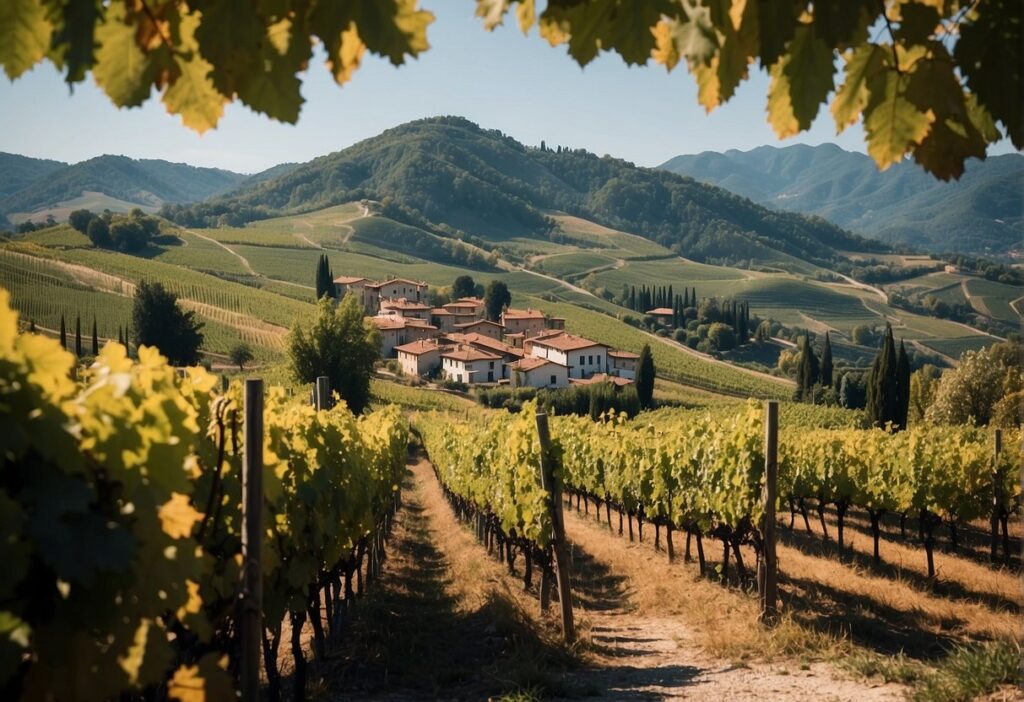
Explore the rich tapestry of wines that Friuli-Venezia Giulia has to offer through the most commonly asked questions. Learn about the exceptional varieties, perfect food pairings, and the best wineries you can visit to experience the distinct flavors of the region.
What are the standout varieties of white wine in the Friuli region?
Friuli is celebrated for its exquisite white wines, particularly the aromatic and zesty Friulano, the mineral-rich Ribolla Gialla, and the fruity Malvasia. Each variety offers a unique taste that captures the essence of Friuli’s terroir.
Can you suggest some notable red wines from Friuli for a tasting?
When it comes to reds, the region’s Pignolo and Schioppettino wines are a must-try. These reds are known for their deep flavors and complexity. The Pignolo is bold and tannic, while the Schioppettino boasts spicy and berry notes.
Which sparkling wines from Friuli should I consider trying?
For those who enjoy bubbles, Friuli’s Ribolla Gialla in its sparkling form offers a crisp and refreshing choice. Additionally, the subtly complex Prosecco made in Friuli provides an elegant sparkling experience.
What food pairings work well with Friuli wines?
Friuli wines pair wonderfully with a range of foods due to their diverse flavor profiles. Pair a light, aromatic Friulano with prosciutto di San Daniele, or enjoy a robust Schioppettino with frico, a traditional Friulian cheese and potato dish.
Could you list some of the top wineries to visit in Friuli?
Your wine journey would be incomplete without visiting top-notch wineries such as Jermann, esteemed for its innovative white wines, and Livio Felluga, a historic winery that is a testament to Friuli’s winemaking heritage.
How does Friuli’s Pinot Grigio differ from other regions’ styles?
Friuli’s Pinot Grigio is noted for its richness and full-bodied character, offering a complex bouquet with floral and pear notes, distinguishing itself from the often lighter and crisper styles found elsewhere.
